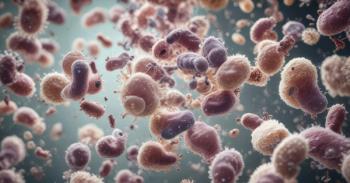
Addressing the Barriers to Fecal Microbiota Transplantation in CDI
Experts reflect on the barriers to utilizing fecal microbiota transplantation therapy in Clostridioides difficile infection.
Episodes in this series

Transcript:
James A. McKinnell, MD: In terms of looking at the barriers to FMT [fecal microbiota transplantation], safety is a big concern, and we should comment on that in terms of what is near and dear to my heart, ESBL [extended spectrum beta-lactamase] and colonization dynamic. Then also the logistical barriers of how we do that and in the reality of this day and age of COVID-19, and how that goes. I’m opening it up to the group.
Sahil Khanna, MBBS, MS: I’ll start because COVID-19 disrupted our program to begin with. We for the longest period have had what I call homegrown FMT or an in-house FMT program with the stool bank that we maintain with donor screening. As soon as COVID-19 hit, data were coming out that this is a viral pathogen that can be present in stool because the gut has…receptors, and the virus goes there and comes to the stool. There were data saying that you could do sewage analysis of a city and predict which city is going to get the next wave of COVID-19, or when they’re going to get it. It was a pause and we’re like, oh my God, we don’t want to be transmitting COVID-19 when we’re trying to treat Clostridioides difficile. It’s probably a more deadly pathogen. We paused when the pandemic started and scratched our heads, put a lot of smart ID [infectious disease] people into our group, I would say that, more ID than GI [gastroenterologists] and said, what can we do to mitigate this risk of COVID-19 transmission?
We came up with a consensus of let’s screen our donors with a nasopharyngeal swab for SARS-CoV-2, this was prevaccination, and do a blood test to look for antibody responses to look for past infection, and current infection. Then once you do that on day 0, start collecting stool on multiple days, but don’t use that stool until you have an end of stool collection test at about 2 weeks. Most stool samples stay in quarantine, like people stay in quarantine, for at least 2 weeks until we have follow-up testing that is available. Again, similar testing with the nasopharyngeal swab and antibody-based test. Then moving forward, starting this year, we’ve had the vaccine available. Our donors have now gotten the vaccine. Despite the vaccine being available, we have not changed our testing and our quarantine protocol. You can imagine how an external force like this can disrupt a well-established program that we had for about 9 years. That is a big barrier for many places who either are dependent internally to have stool material or dependent externally to get it from a stool bank.
James A. McKinnell, MD: That’s the question I was going to lead to, we don’t all have the benefit of a 10-year established FMT program. For those of us who rely on external banks, what does this look like for them? Is this a real threat?
Carl V. Crawford, MD: It’s interesting. The stool banks that are there have done a good job of starting to test stool for certain kinds of pathogens, antibiotic-resistant organisms, SARS-CoV-2. But at this point, as there are several companies that are going to be seeking FDA approval for their FMT products, the stool banks will start winding down because they’re not FDA-approved products. I would anticipate by the end of the year that the supplies that I would typically get will be diminished, and my ability to offer FMT as an option for patients will be confined to these clinical trials, if they’re available.
James A. McKinnell, MD: Does everyone agree with that? That’s a big statement to say we’re looking at, you said reduced availability of outside bank FMT supplies by the end of 2021.
Sahil Khanna, MBBS, MS: If you look at numbers from large stool banks in the United States, they have supplied tens of thousands of FMT products to treat tens of thousands of patients over the last 5 or 6 years of their existence. You can imagine what’s going to happen to that patient population. As Kelly mentioned earlier, epidemiological data show hundreds of thousands of people with recurrent C diff infection, tens of thousands every year with multiply recurrent C diff infection. The options for those patients are going to get somewhat limited, perhaps keep them on long-term suppressive vancomycin, which we know is bad for their microbiome. I know Kelly is almost going to have a fit….
James A. McKinnell, MD: I saw that. I was getting the defibrillator out.
Sahil Khanna, MBBS, MS: But that’s an option just to keep them under control. Clinical trials are an option, or think about sites that can either have their own local FMT material that’s available, or not ideal, but go back to where we first started. Every patient finds their own donor, which is very costly and health economically becomes very difficult. In today’s world, you also must screen the donor before and after just for SARS-CoV-2, forget anything else that you must screen. But we may have to go back to that, at least in the short term.
James A. McKinnell, MD: What’s the alternative to FMT?
Sahil Khanna, MBBS, MS: The alternative to FMT right now in today’s world is the microbiome restoration therapy clinical trials that are available. The good news is that there are now trials that have loosened their inclusion and exclusion criteria, so you can get way more people into open-label studies, which we were not able to do last year and the year before. That has helped us quite a bit.
James A. McKinnell, MD: Thank you for watching this Pharmacy Times® Peer Exchange. If you enjoyed the content, please subscribe to our e-newsletters to receive upcoming Peer Exchanges and other great content right in your inbox.
Transcript edited for clarity.
Newsletter
Stay informed on drug updates, treatment guidelines, and pharmacy practice trends—subscribe to Pharmacy Times for weekly clinical insights.






























